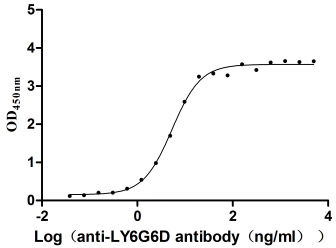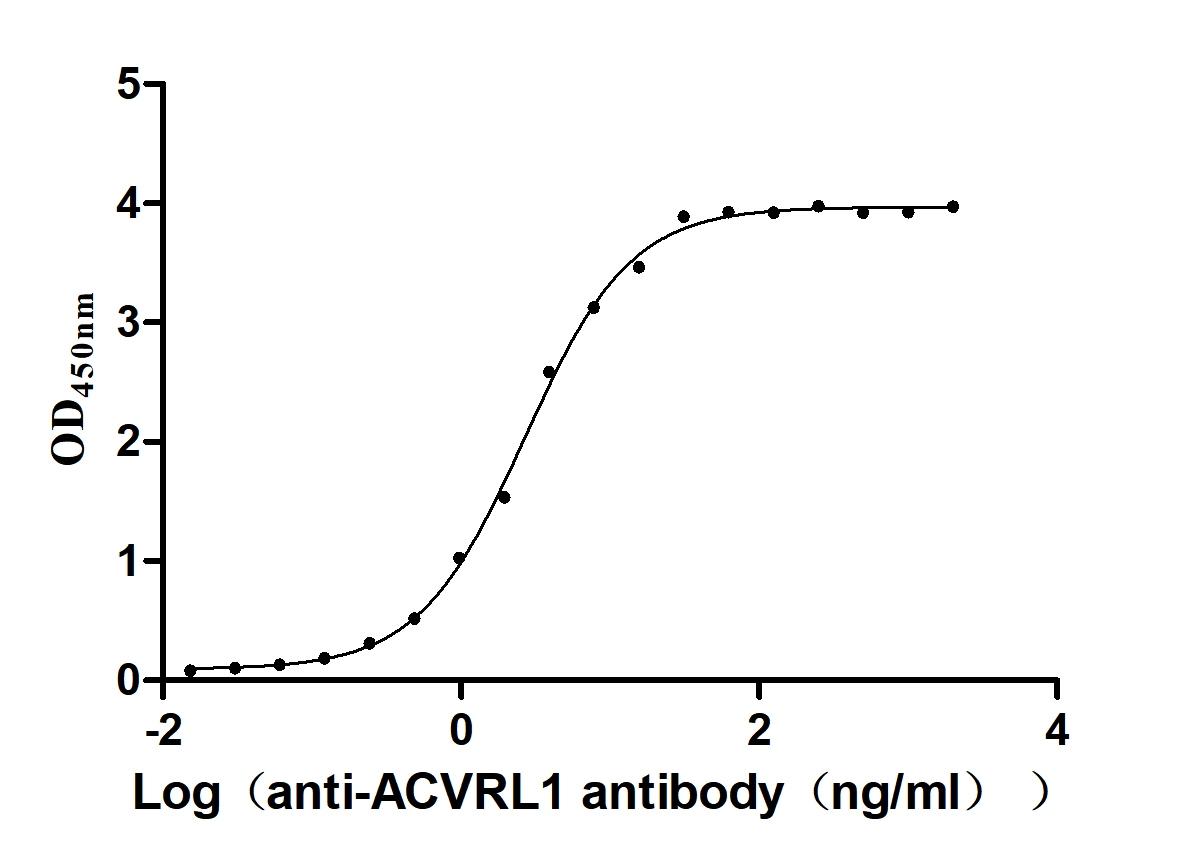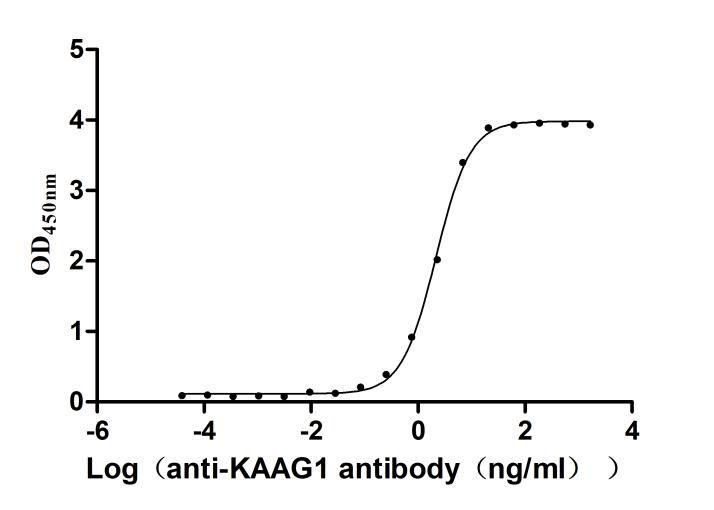Recombinant Human Adiponectin receptor protein 2 (ADIPOR2)
-
中文名称:Recombinant Human Adiponectin receptor protein 2(ADIPOR2)
-
货号:CSB-CF768214HU
-
规格:
-
来源:in vitro E.coli expression system
-
其他:
产品详情
-
基因名:
-
Uniprot No.:
-
别名:ADIPOR2; PAQR2; Adiponectin receptor protein 2; Progestin and adipoQ receptor family member 2; Progestin and adipoQ receptor family member II
-
种属:Homo sapiens (Human)
-
蛋白长度:full length protein
-
表达区域:1-386
-
氨基酸序列MNEPTENRLGCSRTPEPDIRLRKGHQLDGTRRGDNDSHQGDLEPILEASVLSSHHKKSSE EHEYSDEAPQEDEGFMGMSPLLQAHHAMEKMEEFVCKVWEGRWRVIPHDVLPDWLKDNDF LLHGHRPPMPSFRACFKSIFRIHTETGNIWTHLLGCVFFLCLGIFYMFRPNISFVAPLQE KVVFGLFFLGAILCLSFSWLFHTVYCHSEGVSRLFSKLDYSGIALLIMGSFVPWLYYSFY CNPQPCFIYLIVICVLGIAAIIVSQWDMFATPQYRGVRAGVFLGLGLSGIIPTLHYVISE GFLKAATIGQIGWLMLMASLYITGAALYAARIPERFFPGKCDIWFHSHQLFHIFVVAGAF VHFHGVSNLQEFRFMIGGGCSEEDAL
Note: The complete sequence including tag sequence, target protein sequence and linker sequence could be provided upon request. -
蛋白标签:N-terminal 10xHis-tagged
-
产品提供形式:Liquid or Lyophilized powder
Note: We will preferentially ship the format that we have in stock, however, if you have any special requirement for the format, please remark your requirement when placing the order, we will prepare according to your demand. -
缓冲液:Lyophilized from Tris/PBS-based buffer, 6% Trehalose, pH 8.0
-
储存条件:Store at -20°C/-80°C upon receipt, aliquoting is necessary for mutiple use. Avoid repeated freeze-thaw cycles.
-
保质期:The shelf life is related to many factors, storage state, buffer ingredients, storage temperature and the stability of the protein itself.
Generally, the shelf life of liquid form is 6 months at -20°C/-80°C. The shelf life of lyophilized form is 12 months at -20°C/-80°C. -
货期:Basically, we can dispatch the products out in 1-3 working days after receiving your orders. Delivery time may differ from different purchasing way or location, please kindly consult your local distributors for specific delivery time.Note: All of our proteins are default shipped with normal blue ice packs, if you request to ship with dry ice, please communicate with us in advance and extra fees will be charged.
-
注意事项:Repeated freezing and thawing is not recommended. Store working aliquots at 4°C for up to one week.
-
产品描述:
The recombinant Human ADIPOR2 protein is a cell-free system in vitro E.coli expressed Full Length protein. In cell-free systems, synthesis of the protein can be carried out in vitro using extracts of whole cells that are compatible with translation. These cell extracts contain all the molecules and enzymes that are needed to transcribe, translate, and post-translationally modify the recombinant protein. With additional supplements of cofactors, ADIPOR2 proteins can be formed in a few hours. However, this system may not be applicable for the large-scale production of recombinant proteins. Advantages of this system include that proteins can be synthesized without cell culturing; also, it is possible to express many proteins together.
ADIPOR2 is primarily expressed by the liver. ADIPOR2 activates PPARα to facilitate fatty acid catabolism by upregulating genes involved in fatty acid transport, binding and activation, and peroxisomal and mitochondrial fatty acid β-oxidation. ADIPOR2 deficiency reduces PPARα activity. The adiponectin resistance and sensitivity mediated by ADIPOR2 in hepatocytes modulated steatohepatitis progression by changing PPARα activity and ROS accumulation. -
Datasheet & COA:Please contact us to get it.
相关产品
靶点详情
-
功能:Receptor for ADIPOQ, an essential hormone secreted by adipocytes that regulates glucose and lipid metabolism. Required for normal body fat and glucose homeostasis. ADIPOQ-binding activates a signaling cascade that leads to increased PPARA activity, and ultimately to increased fatty acid oxidation and glucose uptake. Has intermediate affinity for globular and full-length adiponectin. Required for normal revascularization after chronic ischemia caused by severing of blood vessels.
-
基因功能参考文献:
- There were no significant associations involving ADIPOR2 with diabetes and hypertriglyceridemia in an admixed Latin American population. PMID: 29145541
- the findings of the present case-control study further exemplify the role of AdipoR2 genetic polymorphisms (rs10773989 and rs1044471) and its protein expression in colorectal carcinogenesis and advancement. PMID: 28765899
- Two polymorphisms, rs2241766 in ADIPOQ gene and rs10773989 in ADIPOR2 gene, especially under the recessive model of inheritance, played independent leading roles in susceptibility to myocardial infarction in Han Chinese. PMID: 29524572
- The results indicated that globular adiponectin inhibited the prooncogenic effects of leptin via AdipoR2-mediated suppression of UHRF1 PMID: 28285359
- Variants of ADIPOR2 could be a determinant for higher FFA levels, and among Chinese Han population, carriers of the CT and TT genotypes for rs2370055 even with normal glucose levels may have significantly higher insulin resistance susceptibility. PMID: 27348122
- We conclude that the PAQR-2 and AdipoR2 proteins share an evolutionarily conserved function that maintains membrane fluidity in the presence of exogenous saturated fatty acids. PMID: 28886012
- Renoprotection of adiponectin is associated with improvement of the endothelial dysfunction, reduction of oxidative stress, and upregulation of endothelial nitric oxide synthase expression through activation of adenosine 5'-monophosphate-activated protein kinase by AdipoR1 and activation of peroxisome proliferator-activated receptor (PPAR)-alpha signaling pathway by AdipoR2. [review] PMID: 28402446
- crystal structure of ADIPOR2 bound to a FFA molecule and show that ADIPOR2 possesses intrinsic basal ceramidase activity that is enhanced by adiponectin PMID: 28329765
- Adiponectin stimulates cPLA2 and COX-2 expression via AdipoR1/2-dependent activation of PKC/NADPH oxidase/mitochondria resulting in ROS accumulation, p300 phosphorylation, and histone H4 acetylation. PMID: 27288489
- These results indicate that miR-150 can attenuate oxidized low-density lipoprotein - induced lipid accumulation in macrophages via promotion of cholesterol efflux. The suppressive effects of miR-150 on macrophage foam cell formation are mediated through targeting of AdipoR2. PMID: 27216461
- Decreased expression of ADIPOR2 is associated with polycystic ovary syndrome. PMID: 27075719
- Strong Functional Association of adipor2 and cdh13 with adipoq PMID: 25388841
- PCR results showed expression of adiponectin, AdipoR1, AdipoR2, follicle-stimulating hormone receptor (FSHR), and luteinizing hormone receptor (LHR) in granulosa cells (GCs). After controlling body mass index (BMI) values, qRT-PCR demonstrated a decreased expression of adiponectin system in GCs of polycystic ovary syndromepatients compared to those in controls PMID: 26631404
- Endometriotic stromal cell proliferation is linked to increased expression of AdipoR2 (and AdipoR1) gene receptor expression. PMID: 26459399
- Results identified miR-375 and its direct target, ADIPOR2 as androgen regulated molecules suggesting an important role in the mechanism of the increase in visceral fat mass and the associated insulin resistance caused by testosterone deficiency. PMID: 26219823
- Two ADIPOR2 SNPs (rs11061925 and rs929434) were associated with fasting plasma triglyceride concentrations in the entire sample of HIV-infected patients. PMID: 26111083
- In conclusion, neutrophil AdipoRs (AdipoR1, AdipoR2) upregulation was associated with early stages of vascular injury, hypertension severity, and low serum levels of adiponectin PMID: 26146630
- Results demonstrate that the non-conserved N-terminal trunks dictate the cell-surface expression and temporal signaling profiles of AdipoR1 and AdipoR2. PMID: 25892445
- Data indicate the thermal stability of purified N-terminally truncated mutants of adiponectin receptors AdipoR1 and AdipoR2. PMID: 25575462
- This study indicated that ApN may play a role in the progression of colorectal adenomatous polyps to carcinoma through actions on adipo-R1 and adipo-R2 receptors. PMID: 25640382
- crystal structures of the human adiponectin receptors AdipoR1 and AdipoR2 at 2.9 A and 2.4 A resolution, respectively PMID: 25855295
- down-regulation of adiponectin receptors (AdipoR1, R2, and T-cadherin) in osteoarthritic chondrocytes PMID: 24888493
- These results strengthen the evidence for the role of AdipoR2 in prostate cancer progression. PMID: 25863129
- AA genotype and A allele of rs12342 in the adiponectin receptor 2 gene may increase the risk of ischemic stroke, particularly the risk of atherosclerosis cerebral infarction PMID: 25299095
- miR-423-3p plays a novel oncogenic role in laryngeal cancer via AdipoR2 suppression. PMID: 25337209
- In conclusion, all these observations suggest that adiponectin influences bone metabolism decreasing the levels of bone formation. PMID: 24673523
- The improvement of insulin sensitivity by physical exercise is related to adiponectin and/or AdipoR1/R2 expression changes. PMID: 25126860
- macrophage polarization is a key determinant regulating AdipoR expression and differential APN-mediated macrophage inflammatory responses PMID: 25392268
- In those with advanced stage gastric cancer, 7 of 39 had low Adipo-R1 expression (17.9%) and 16 had low Adipo-R2 expression (41%). PMID: 24969908
- Low ADIPOR2 expression is associated with hepatocellular carcinoma. PMID: 24619866
- AdipoR1 stimulates IL10 production by activating the AMPK and MAPKp38 pathways, whereas AdipoR2 modifies inflammatory processes by activating the COX-2 and PPARG pathways. PMID: 25261236
- adiponectin receptors(AdipoR1 and -R2 ) are located, or re-located, in the plasma membrane with distribution in the cytoplasm when mononuclear cells are committed to differentiate to osteoclasts. PMID: 23971629
- AdipoR2 is regulated by the LH receptor function via a cAMP dependent mechanism. PMID: 23779096
- SNPs of both the adiponectin gene and its receptors AdipoR1 and AdipoR2 (including their haplotypes) appear as candidate genes and involved in the development of the state of insulin resistance. PMID: 23656997
- Studies indicate that altered levels of adiponectin and leptin or their cognate receptors in cancers can ultimately lead to an imbalance in downstream molecular pathways. PMID: 23355630
- APN, AdipoR1, and AdipoR2 exist in human and mouse retinas and retinal APN and AdipoR1 protein levels are elevated in type 1 diabetes mellitus mice. PMID: 23922494
- Collectively these studies demonstrate that the non-conserved region of AdipoR2 restricts its cell-surface expression and raise the possibility that the majority of cell-surface AdipoR2 may be present in the form of heterodimers. PMID: 23376713
- Data indicate that AdipoR1 was expressed in 27 % of primary tumors and AdipoR2 in 47 %. PMID: 22907586
- High AdipoR2 expression is associated with gastric carcinoma. PMID: 23358721
- Circulating concentrations of adiponectin were not affected by type I diabetes, but expression of adiponectin receptors on blood monocytes was markedly reduced and inversely associated with insulin resistance. PMID: 23386639
- The pleiotropic, tissue-dependent functions of adiponectin depend on the expression levels of AdipoR1 and AdipoR2. PMID: 23255609
- Reduced hepatic expression of adiponectin and adipoR2 might be of pathophysiological relevance in chronic hepatitis B patients with metabolic syndrome. PMID: 22819899
- Increased mRNA and protein expression of adiponectin receptors is related with increased aortic stiffness, coronary and peripheral atherosclerosis in patients with coronary artery disease. PMID: 22534793
- Adiponectin differentially alters the expression of Adipor1/Adipor2 as well as genes related to steroidogenesis, ovulation, and apoptosis in cumulus cells versus granulosa cells. PMID: 22633650
- adiponectin receptor-2 795G/A polymorphisms and relation with insulin resistance PMID: 22187345
- In a Finnish type 2 diabetes population, four SNPs in ADIPOR2 (rs10848554, rs11061937, rs1058322, rs16928751) are associated with cardiovascular disease risk, and two remain significant. PMID: 21943112
- While the decrease in leptin receptor levels in chronic myeloid leukemia patients was confirmed, the increase in AdipoR1 levels and relevant decrease in AdipoR2 levels depicted their possible involvement in chronic myeloid leukemia pathogenesis. PMID: 22082804
- s evaluated 29 common single-nucleotide polymorphisms (SNP) in ADIPOQ (n = 13), ADIPOR1 (n = 5), and ADIPOR2 (n = 11) in relation to the risk of prostate cancer. PMID: 21960694
- Adiponectin suppression of macrophage lipid accumulation/foam cell formation is mediated through AdipoR1/AdipoR2/APPL1. AdipoR1 and AdipoR2 exhibited a differential ability to regulate inflammatory cytokines and SR-A1. PMID: 22227293
- In vitro and ex vivo evidence for a causal role of adiponectin in endometrial cancer. PMID: 21980131
显示更多
收起更多
-
亚细胞定位:Cell membrane; Multi-pass membrane protein.
-
蛋白家族:ADIPOR family
-
组织特异性:Ubiquitous. Highly expressed in skeletal muscle, liver and placenta. Weakly expressed in brain, heart, colon, spleen, kidney, thymus, small intestine, peripheral blood leukocytes and lung.
-
数据库链接:
HGNC: 24041
OMIM: 607946
KEGG: hsa:79602
STRING: 9606.ENSP00000349616
UniGene: Hs.371642
Most popular with customers
-
Recombinant Human Angiopoietin-2 (ANGPT2) (Active)
Express system: Mammalian cell
Species: Homo sapiens (Human)
-
Recombinant Human G-protein coupled receptor family C group 5 member D (GPRC5D)-VLPs (Active)
Express system: Mammalian cell
Species: Homo sapiens (Human)
-
Recombinant Human Somatostatin receptor type 2 (SSTR2)-VLPs (Active)
Express system: Mammalian cell
Species: Homo sapiens (Human)
-
Recombinant Human Claudin-6 (CLDN6)-VLPs, Fluorescent (Active)
Express system: Mammalian cell
Species: Homo sapiens (Human)
-
Recombinant Human Dickkopf-related protein 1 (DKK1) (Active)
Express system: Mammalian cell
Species: Homo sapiens (Human)
-
Recombinant Macaca fascicularis lymphocyte antigen 6 family member G6D (LY6G6D) (Active)
Express system: Yeast
Species: Macaca fascicularis (Crab-eating macaque) (Cynomolgus monkey)
-
Recombinant Human Serine/threonine-protein kinase receptor R3 (ACVRL1), partial (Active)
Express system: Baculovirus
Species: Homo sapiens (Human)
-
Recombinant Human Kidney-associated antigen 1(KAAG1) (Active)
Express system: E.coli
Species: Homo sapiens (Human)


-AC1.jpg)
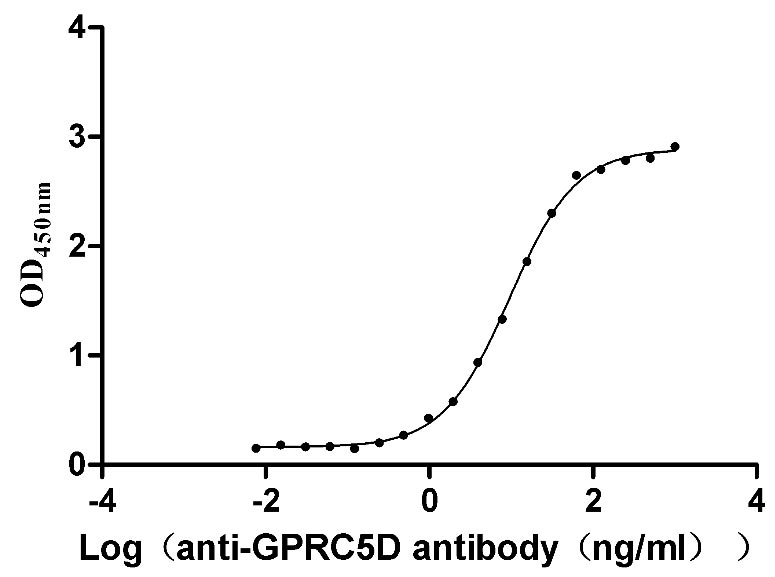
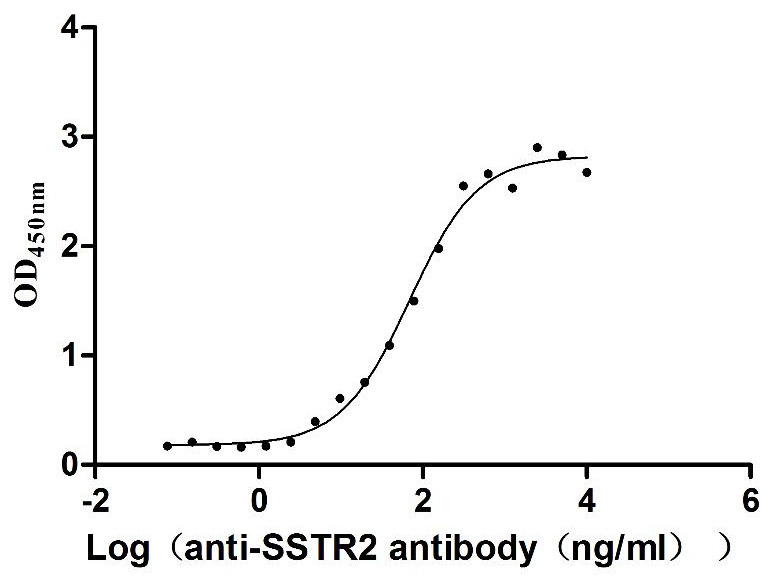
f4-AC1.jpg)
-AC1.jpg)
